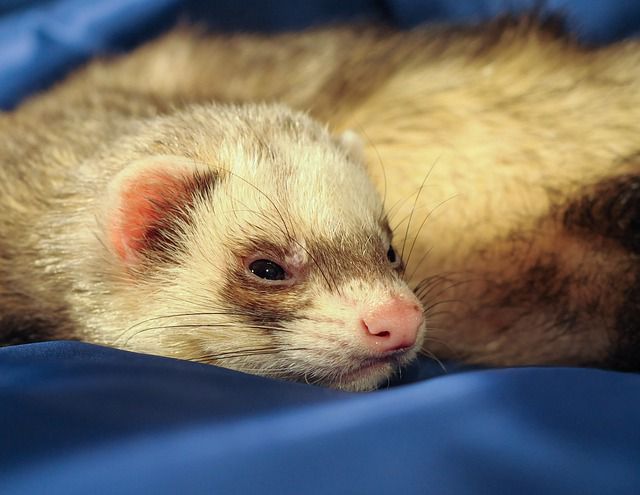9 Potential Distemper in Ferrets Symptoms & Tips

Hey there, fellow ferret lovers! If you’re reading this, chances are you’re concerned about distemper in ferrets and its dreaded symptoms.
Well, fret not, because in this blog post, we’re diving deep into the world of distemper and uncovering the telltale signs to watch out for.
Let’s get started…
What is Distemper in Ferrets?
Distemper in ferrets is a highly contagious viral disease that affects their respiratory, gastrointestinal, and nervous systems. It is caused by the canine distemper virus (CDV) and can be fatal.
Symptoms of distemper in ferrets include fever, coughing, sneezing, nasal discharge, vomiting, diarrhea, and neurological signs such as seizures and muscle twitching.
The virus is primarily transmitted through direct contact with infected animals or contaminated objects.
Vaccination is the most effective way to prevent distemper in ferrets, and it is recommended to follow a regular vaccination schedule to protect their health.
How Ferrets Get Distemper
Ferrets can contract distemper, a viral disease, through exposure to infected animals or contaminated environments.
The virus can be transmitted through respiratory secretions, urine, and feces. Once the virus enters a ferret’s body, it targets the respiratory, gastrointestinal, and nervous systems.
Distemper in Ferrets Symptoms

Here are some symptoms of distemper in ferrets and how to address each symptom:
1. Vomiting and Diarrhea
Vomiting and diarrhea are common symptoms of distemper in ferrets. It is important to address these symptoms to prevent dehydration and provide comfort to the affected ferret.
Here are some steps to address vomiting and diarrhea in ferrets with distemper:
- Fluid Replacement: Ensure that the ferret stays hydrated by providing access to fresh water at all times. You can also offer electrolyte solutions specifically designed for small animals to help replenish lost fluids and minerals.
- Small, Frequent Meals: Offer small, easily digestible meals to the ferret. Feed a bland diet consisting of boiled chicken or turkey and plain, cooked rice. Avoid feeding fatty or spicy foods as these can exacerbate gastrointestinal upset.
- Probiotics: Consider giving probiotics to support the ferret’s digestive system. Probiotics contain beneficial bacteria that can help restore the balance of the gut flora and improve digestion.
- Veterinary Care: If vomiting and diarrhea persist or worsen, it is crucial to seek veterinary care. The veterinarian may prescribe medications to alleviate these symptoms and address any underlying issues.
2. Loss of Appetite
Loss of appetite is another common symptom of distemper in ferrets. It is important to address this symptom to ensure the ferret receives proper nutrition during their recovery.
Here are some steps to address loss of appetite in ferrets with distemper:
- Tempting Foods: Offer a variety of tempting, highly palatable foods to stimulate the ferret’s appetite. For example, you can try offering cooked chicken or turkey, baby food (without onion or garlic), or ferret-specific treats.
- Wet Food: Wet or canned food may be more appealing to a ferret with a decreased appetite. You can mix wet food with warm water to make it more enticing and easier to eat.
- Hand-Feeding: If necessary, you may need to hand-feed the ferret using a syringe or a specialized feeding tube under the guidance of a veterinarian. This ensures that the ferret receives the necessary nutrients to support their recovery.
- Veterinary Care: If the ferret’s appetite does not improve or if they are refusing all food, it is important to consult a veterinarian. They can assess the ferret’s condition and provide appropriate medical intervention, such as appetite stimulants or nutritional support.
3. Neurological Symptoms
Neurological symptoms can occur in ferrets with distemper and may include circling behavior, head tilt, muscle twitches, convulsions, seizures, and partial or complete paralysis.
These symptoms indicate severe nervous system involvement and require immediate veterinary attention.
Here are some steps to address neurological symptoms in ferrets with distemper:
- Isolate the Ferret: Ensure the ferret is in a safe, quiet, and comfortable environment to minimize the risk of injury during seizures or convulsions.
- Avoid Stress: Limit handling and exposure to external stimuli that may exacerbate the ferret’s neurological symptoms.
- Veterinary Care: Contact a veterinarian immediately if the ferret exhibits severe neurological symptoms. The veterinarian will assess the ferret’s condition and may recommend supportive care, medications to control seizures, and other appropriate treatments.
- Consider Euthanasia: In severe cases where the ferret’s quality of life is significantly compromised and they are experiencing prolonged suffering, euthanasia may be the most humane option. This decision should be made in consultation with a veterinarian.
Learn more about why your ferret is shaking.
4. Fever and Lethargy
Fever and lethargy are common symptoms of distemper in ferrets. When a ferret has a fever, their body temperature rises above the normal range, typically around 100-103°F (37.8-39.4°C).
Lethargy refers to a lack of energy or enthusiasm, where the ferret may appear weak, tired, and less active than usual.
To address fever and lethargy in a ferret with distemper, it is important to provide supportive care and monitor their condition closely. Here are a few steps that can be taken:
- Isolate the ferret: Distemper is highly contagious, so it is crucial to separate the infected ferret from other ferrets to prevent the spread of the virus.
- Provide a comfortable environment: Ensure that the ferret has a warm and quiet space to rest. Maintain a consistent temperature in the room, around 70-75°F (21-24°C).
- Offer plenty of fresh water: It is important to keep the ferret hydrated. Ensure that clean water is readily available at all times.
- Encourage small, frequent meals: Ferrets with distemper may have a reduced appetite. Offer small, easily digestible meals throughout the day to provide necessary nutrition.
- Monitor the ferret’s temperature: Regularly check the ferret’s body temperature using a rectal thermometer. If the fever persists or worsens, consult a veterinarian for further guidance.
5. Coughing and Labored Breathing
Coughing and labored breathing are respiratory symptoms commonly associated with distemper in ferrets.
These symptoms can be distressing for the ferret and may indicate respiratory complications due to the viral infection.
To address coughing and labored breathing in a ferret with distemper, it is important to take the following steps:
- Provide a clean and well-ventilated environment: Ensure that the ferret’s living space is clean, free from dust, and well-ventilated. This can help alleviate respiratory distress.
- Avoid exposure to irritants: Minimize exposure to smoke, strong odors, and other irritants that can worsen coughing and breathing difficulties.
- Keep the ferret’s environment humidity-controlled: Maintaining an appropriate level of humidity in the ferret’s environment can help ease respiratory symptoms. Consult a veterinarian for specific recommendations on humidity levels.
- Offer supportive care: Provide comfort to the ferret by offering a warm and cozy resting area. Encourage rest and minimize physical exertion to reduce respiratory stress.
- Consult a veterinarian: If the coughing and labored breathing persist or worsen, it is important to seek veterinary attention promptly. A veterinarian can provide a proper diagnosis and recommend appropriate treatment options, such as medications to alleviate respiratory symptoms.
Learn more about ferret whimpering.
6. Eye and Nose Discharge
Eye and nose discharge are common symptoms of distemper in ferrets. The discharge may range from watery to pus-like in consistency and can cause discomfort and irritation for the ferret.
To address eye and nose discharge in a ferret with distemper, consider the following steps:
- Gently clean the discharge: Use a clean, damp cloth or cotton pad to gently clean the discharge from the ferret’s eyes and nose. Be careful not to apply excessive pressure or cause further irritation.
- Maintain proper hygiene: Ensure that the ferret’s living space is clean and well-maintained. Regularly clean bedding, toys, and other items to prevent the buildup of bacteria and viruses.
- Monitor the discharge: Keep an eye on the color, consistency, and amount of discharge. If the discharge becomes excessive, changes color, or develops a foul odor, consult a veterinarian for further evaluation.
- Consult a veterinarian: It is important to consult a veterinarian for a proper diagnosis and treatment plan. They may prescribe medications, such as antibiotics or eye drops, to address the underlying infection and alleviate the discharge.
7. Weight Loss
One of the common symptoms of distemper in ferrets is weight loss. The virus affects the ferret’s gastrointestinal system, leading to a loss of appetite and subsequent weight loss.
To address weight loss in ferrets with distemper, it is important to provide supportive care and ensure proper nutrition.
Here are some steps you can take:
- Offer a highly palatable, nutrient-dense diet: Ferrets may have a reduced appetite, so offering high-quality ferret-specific food can help ensure they receive adequate nutrition. Wet or canned food can be more appealing to encourage eating.
- Provide frequent, small meals: Dividing the daily food intake into smaller, more frequent meals can make it easier for the ferret to eat and digest.
- Monitor hydration: Make sure your ferret has access to fresh water at all times and monitor their hydration levels. If necessary, you can use a syringe or dropper to administer fluids under the guidance of a veterinarian.
- Consult a veterinarian: If weight loss persists or worsens, it is important to consult a veterinarian for a proper diagnosis and treatment plan. They may recommend additional interventions, such as appetite stimulants or nutritional supplements.
8. Sneezing and Coughing
Sneezing and coughing are respiratory symptoms commonly seen in ferrets with distemper.
The virus can affect the respiratory system, leading to inflammation and respiratory distress.
To address sneezing and coughing in ferrets with distemper, consider the following:
- Minimize exposure to irritants: Provide a clean and dust-free environment for your ferret. Avoid using products that may cause respiratory irritation, such as strong cleaning chemicals or aerosols.
- Ensure proper ventilation: Good airflow and ventilation can help reduce respiratory symptoms. Avoid keeping the ferret in a humid or poorly ventilated area.
- Seek veterinary care: If the sneezing and coughing persist or worsen, it is important to consult a veterinarian. They may recommend medications to help alleviate respiratory symptoms or provide supportive care.
9. Facial and Perineal Dermatitis
Facial and perineal dermatitis, characterized by redness, inflammation, and skin lesions, can occur in ferrets with distemper.
The virus can cause skin manifestations due to its impact on the immune system.
To address facial and perineal dermatitis in ferrets with distemper, consider the following:
- Keep the affected areas clean: Gently clean the affected areas with a mild, non-irritating cleanser recommended by your veterinarian. Avoid using harsh soaps or products that may worsen the dermatitis.
- Apply topical treatments: Your veterinarian may prescribe topical treatments, such as anti-inflammatory creams or ointments, to alleviate the symptoms and promote healing.
- Monitor for secondary infections: Skin lesions can make the ferret more susceptible to secondary bacterial or fungal infections. Monitor the affected areas for signs of infection, such as increased redness, swelling, or discharge, and consult a veterinarian if necessary.
- Support the immune system: Providing a balanced diet, proper hydration, and reducing stress can help support the ferret’s immune system and aid in the healing process.
Learn more about health problems in ferrets.
Diagnosis of Distemper in Ferrets
Distemper in ferrets is a viral disease that can cause a range of symptoms, including respiratory distress, gastrointestinal issues, and neurological signs.
Diagnosis of distemper in ferrets typically involves a combination of clinical signs, laboratory tests, and imaging studies.
Laboratory tests, such as PCR and serology, can be used to detect the virus or antibodies in the blood or other body fluids.
Radiographs or other imaging studies may be performed to assess the extent of organ involvement.
Treatment options for distemper in ferrets are limited and mainly focus on supportive care to manage symptoms and prevent secondary infections. Vaccination against distemper is an important preventive measure for ferrets.
Treatment Options for Distemper in Ferrets

Distemper is a serious viral disease that can affect ferrets. Unfortunately, there is currently no cure for distemper in ferrets.
However, supportive care and preventive measures can help manage the symptoms and improve the ferret’s quality of life.
Supportive Care
Supportive care is the primary treatment approach for distemper in ferrets. It involves providing the ferret with necessary medical support to alleviate symptoms and help the immune system fight the infection. Supportive care measures may include:
- Fluid therapy: Administering fluids to prevent dehydration and maintain hydration.
- Nutritional support: Providing a balanced and easily digestible diet to ensure the ferret receives proper nutrition.
- Medications: Prescribing medications to manage symptoms such as fever, cough, and gastrointestinal issues. Antibiotics may be given to prevent secondary bacterial infections.
- Isolation: Isolating the infected ferret to prevent the spread of the virus to other animals.
Vaccination
Preventive vaccination is the most successful treatment for distemper in ferrets. Currently, the only vaccine approved for ferrets is the Purevax Ferret Distemper Vaccine (Merial).
Vaccination is highly recommended to protect ferrets from the disease. It is important to follow the recommended vaccination schedule and consult with a veterinarian about the appropriate timing and frequency of vaccinations.
Related Questions
Can distemper in ferrets cause neurological symptoms?
Yes, unfortunately, distemper can affect the nervous system in ferrets. Neurological symptoms may include seizures, twitching, weakness, incoordination, and paralysis.
How long does it take for distemper symptoms to appear after exposure?
The incubation period for distemper in ferrets is typically around 7 to 10 days. After exposure, it may take this amount of time for symptoms to start showing. However, it’s important to note that some ferrets may not show symptoms at all, making it crucial to vaccinate them.
Is distemper in ferrets contagious to other animals or humans?
Distemper primarily affects canines, but it can also infect other animals, including ferrets. However, it cannot be transmitted to humans. It is highly recommended to keep infected ferrets away from other animals to prevent the spread of the disease.
Can distemper be cured in ferrets?
Unfortunately, there is no cure for distemper in ferrets. Treatment mainly focuses on managing symptoms and providing supportive care. Vaccination is the best preventive measure to protect your ferret from this deadly disease.
How can I protect my ferret from distemper?
The best way to protect your ferret from distemper is by ensuring they receive the distemper vaccination. This should be done at an early age and followed up with regular booster shots. Additionally, practicing good hygiene and avoiding contact with infected animals can help reduce the risk of exposure.
Conclusion
In conclusion, it’s crucial for ferret owners to be aware of the symptoms of distemper in their ferrets. From respiratory issues to neurological problems, these signs can indicate a serious health concern.
By staying vigilant and seeking prompt veterinary care, we can ensure the well-being and longevity of our beloved ferrets. Stay informed, stay proactive, and give your ferret the best chance at a happy and healthy life.
